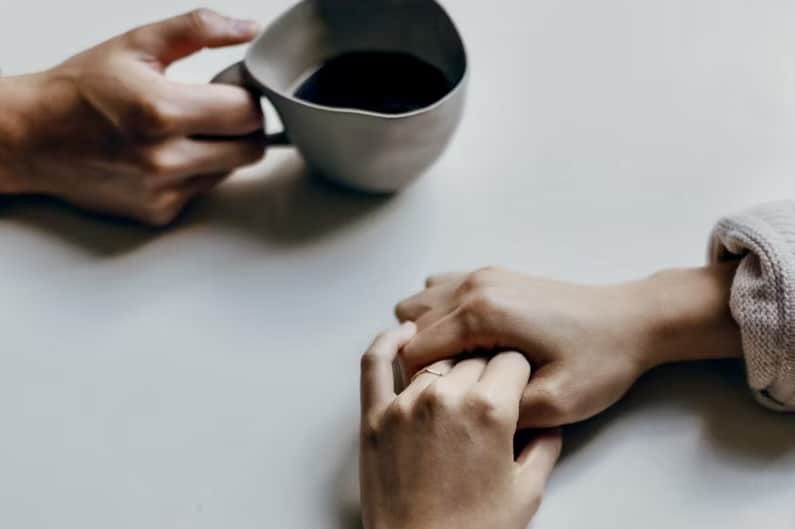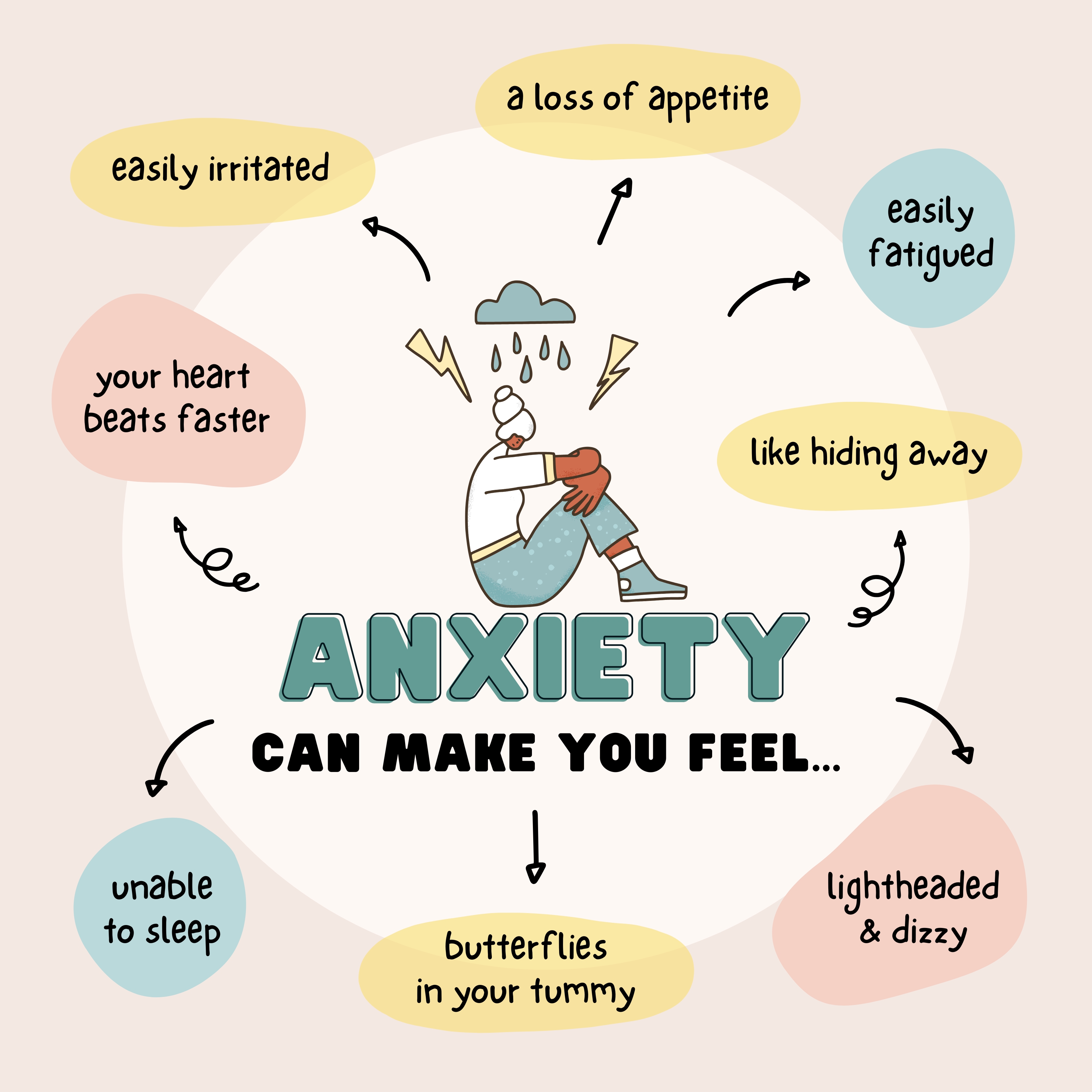Individual counselling for anxiety sessions that change lives
Individual counselling for anxiety sessions that change lives
Blog Article
Discovering Different Methods in Therapy for Stress And Anxiety Disorder for Long Lasting Modification
When tackling stress and anxiety disorders, it's important to explore a range of therapy techniques. Each method provides unique understandings and devices to aid you manage your signs efficiently. You might discover that incorporating strategies can produce the most effective outcomes. Comprehending the nuances of these approaches is crucial to fostering long-term change. What happens if the appropriate mix could launch a brand-new degree of psychological well-being for you?
Understanding Anxiety Conditions: A Quick Review
Anxiousness conditions, which influence millions of people worldwide, can considerably affect everyday life. You could experience overwhelming sensations of fear or stress that seem irrepressible. These feelings can bring about physical signs like an auto racing heart, sweating, or also lightheadedness. Usual sorts of anxiousness conditions consist of generalized anxiousness disorder, panic attack, and social anxiousness disorder. Each has distinct signs, yet they all share a propensity to disrupt your regular and relationships.Understanding the origin of your anxiousness is crucial. It may stem from genes, mind chemistry, or life experiences. Identifying your triggers can aid you handle your reactions much better. It is necessary to remember that you're not the only one in this struggle. Lots of people deal with similar challenges, and seeking aid is a solid action toward feeling much better. By finding out about anxiety conditions, you're currently on the path to understanding and managing your problem better.
Cognitive-Behavioral Therapy: Testing Negative Thought Patterns
In Cognitive-Behavioral Treatment, you'll begin by identifying the unfavorable idea sets off that add to your stress and anxiety. As soon as you recognize these ideas, you'll work with changing them with even more favorable options. Together, you'll develop reliable coping techniques to aid handle your anxiousness in day-to-day scenarios.
Determining Adverse Idea Triggers

Acknowledging the specific triggers behind your negative thoughts can be necessary in managing anxiousness when you run into moments of distress. Start by paying focus to scenarios that prompt feelings of fear or fear. Is it a jampacked area, a forthcoming deadline, or a discussion with particular individuals? Jot down these circumstances in a journal. This will aid you recognize patterns in your reasoning. Notice physical feelings that accompany your adverse thoughts, like a racing heart or tightness in your breast. By determining these triggers, you get insight into what's sustaining your stress and anxiety. Understanding these connections is the very first step in testing those thoughts and ultimately regaining control over your emotional responses.
Replacing Thoughts With Positives
Testing negative idea patterns is a crucial action in transforming your state of mind and decreasing anxiousness. You might commonly locate yourself trapped in cycles of insecurity or devastating thinking. Rather than letting these ideas dictate your feelings, practice changing them with positive affirmations or sensible choices. When you believe, "I can not handle this," change it to, "I can handle obstacles one action at a time." This easy change can greatly influence your mood. Consistently recognizing and responding to these negative ideas helps create a healthier interior discussion. Bear in mind, it takes some time and effort, yet consistently practicing this method can result in lasting change, equipping you to face anxiousness with restored confidence and strength.
Structure Coping Approaches With Each Other
Changing adverse thoughts is only the start of handling anxiousness successfully. To produce enduring change, you need to construct coping strategies that equip you. Cognitive-Behavioral Therapy (CBT) assists you recognize and challenge those unhelpful idea patterns. With each other, you and your therapist can explore exactly how these ideas effect your feelings and behaviors.Start by developing functional strategies, like journaling or mindfulness exercises, that allow you to face anxiousness head-on. When you face your fears progressively, you'll find out to react in different ways.

Mindfulness and Acceptance-Based Approaches: Cultivating Present-Moment Awareness
As you navigate the complexities of anxiousness, integrating mindfulness and acceptance-based methods can significantly boost your capability to grow present-moment recognition. By concentrating on the here and currently, you'll find that you can observe your ideas and feelings without judgment (Counseling services for anxiety). This technique assists you recognize your anxiousness without really feeling bewildered by it.Engaging in mindfulness exercises, such as deep breathing, body scans, or led meditations, permits you to ground yourself in your current experience. Acceptance-based methods encourage you to embrace your emotions instead than fight versus them. They lose their power over you.Incorporating these techniques right into your daily regimen can change how you respond to anxiousness when you approve your sensations. You'll establish resilience and discover to navigate difficult scenarios with greater simplicity. Inevitably, cultivating present-moment recognition lays the structure for long lasting modification, equipping you to lead a more fulfilling life
Direct Exposure Treatment: Facing Worries Progressively
Exposure treatment assists you confront your concerns in a progressive means, making it much less overwhelming. You'll learn techniques to encounter anxiety-provoking scenarios action by step, while likewise developing coping techniques to manage your reactions. This method empowers you to take control and reduce anxiousness in time.
Steady Exposure Methods

When encountering anxiousness, progressively facing your worries can be an effective means to gain back control. This method, recognized as gradual direct exposure, includes gradually revealing yourself to the situations or things that trigger your anxiousness. Beginning with much less intimidating scenarios and progressively function your means approximately even more challenging ones. If you're afraid of public speaking, you may begin by talking in get more info front of a mirror, then proceed to sharing ideas with a close friend, and at some point deal with a tiny team. Each step helps desensitize you to the worry, developing your self-confidence in time. Remember, it's necessary to rate on your own and celebrate tiny triumphes as you move with this procedure, strengthening your ability to handle anxiety effectively.
Building Coping Approaches
Structure reliable coping methods is crucial for handling anxiousness, particularly as you face your anxieties slowly - Counseling services for anxiety. One powerful technique is direct exposure treatment, where you start by encountering your anxieties in a controlled way. Begin with less intimidating scenarios and gradually work your way as much as even more tough situations. This progressive direct exposure assists desensitize you to anxiousness activates, making them much less overwhelming.Incorporate leisure methods, such as deep breathing or mindfulness, to calm your mind throughout direct exposure. Track your progress, commemorating tiny triumphes along the method to increase your self-confidence. Keep in mind, it's all right to take your time; the goal isn't perfection however constant enhancement. By building these approaches, you'll encourage yourself to navigate anxiousness and embrace life much more completely
Psychodynamic Therapy: Discovering Source of Anxiety
Psychodynamic therapy checks out the subconscious mind, exposing the origin of your anxiousness. By examining your thoughts, feelings, and past experiences, this technique aids you uncover underlying conflicts and unsettled issues that might add to your current anxiety. You'll deal with a therapist to explore youth experiences, relationships, and psychological patterns that shape your responses today.As you get insight into these deeper layers of your mind, you'll begin to identify how past occasions influence your existing behavior. This understanding can bring about catharsis, enabling you to refine emotions you could have suppressed.Through the therapeutic partnership, you can also recognize defense reaction that might have developed gradually, providing a clearer path to change. Ultimately, psychodynamic therapy equips you with the tools to address your stress and anxiety at its core, advertising lasting makeover in your psychological well-being.
Integrative and Alternative Methods: Integrating Strategies for Greater Efficacy
Integrating different healing techniques can improve your trip towards managing anxiety a lot more properly. By combining elements from cognitive-behavioral therapy, mindfulness methods, and all natural strategies, you can create a customized method that resolves your one-of-a-kind needs. You could use cognitive-behavioral techniques to test adverse idea patterns while including mindfulness workouts to ground yourself in the present moment.Additionally, exploring holistic practices such as yoga or meditation can advertise relaxation and lower anxiousness signs. This mix allows you to develop higher self-awareness and resilience.Experimenting with these varied methods can help you find what resonates most with you. Keep in mind, it has to do with locating a harmony that works, rather than adhering to a single technique. This integrative method not only uses instant relief but likewise fosters long-lasting abilities for taking care of stress and anxiety, empowering you to reclaim control over your life.
The Role of Assistance Systems: Building Resilience Via Link
While it could seem that handling anxiety is a solitary trip, having a strong support system can play a crucial duty in your resilience. Surrounding on your own with empathetic close friends, household, or assistance groups develops a risk-free room where you can honestly share your experiences and sensations. When you get in touch with others, you advise yourself that you're not the only one in this struggle.These relationships supply inspiration and can supply useful coping approaches that have actually benefited others. It's likewise a chance to gain viewpoint; close friends can assist you see scenarios in different ways, lowering feelings of isolation.Moreover, psychological support promotes a feeling of belonging, which can significantly ease stress and anxiety signs. By leaning on your support group, you can build strength and take on challenges better. Bear in mind, reaching out for assistance is a sign of strength, and it can make all the distinction in your trip towards taking care of anxiousness.
Regularly Asked Concerns
What Are the Typical Signs And Symptoms of Anxiety Disorders?
You may experience uneasyness, tiredness, difficulty concentrating, impatience, muscular tissue stress, and sleep disturbances. Physical signs and symptoms can consist of rapid heartbeat, sweating, and trembling. Identifying these indications early can help you seek proper assistance and therapy.
For How Long Does Therapy Typically Last for Anxiety Disorders?
Therapy for anxiety problems typically lasts anywhere from a few weeks to a number of months. It truly relies on your specific demands, progress, and the strategies your therapist utilizes to aid you handle your stress and anxiety efficiently.
Can Medication Be Utilized Along With Therapy for Stress and anxiety?
Yes, medication can absolutely be used alongside treatment for anxiety. Incorporating both methods typically improves treatment efficiency, aiding you take care of signs while exploring underlying problems via counseling (Counseling services for anxiety). Always consult your healthcare company for tailored advice
Are There Self-Help Techniques for Handling Stress And Anxiety?
Yes, there are a number of self-help methods for taking care of anxiety. You can exercise mindfulness, participate in normal exercise, keep a balanced diet regimen, establish a routine, and utilize deep breathing strategies to help reduce stress and anxiety signs effectively.
Exactly how Do I Know if I Need Specialist Help for Anxiousness?

Report this page